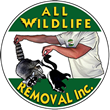Raccoons are pesky critters. Not only will they destroy your property, ripping into insulation to make their nests in your attic and ripping holes in the exterior of your home to gain access. They’re also carriers of zoonotic diseases which are harmful to humans as well as our pets. It is not only through a scratch or bites that we can contract these diseases, they are also transmitted through feces, urine, and saliva. If you notice raccoon activity around your house, be aware of your surroundings and avoid not only interacting with the animals themselves, but also with their excrement or any area that may have been contaminated. For example, if you have any water gathered on your property that raccoons have access to, avoid letting your pets drink from that source. Common sense stuff like that will go along way to keeping your entire household safe.
Although most of these diseases have very low occurrence rates in humans, it’s important to be aware of the associated risks and signs to look out for.
Below are five health risks associated with raccoons that you need to know about.
Raccoon Roundworm
 Raccoon roundworm is a rare but very dangerous infection that can affect both humans and our pets. It attacks the central nervous system and is one of the most serious infection you could contract from wild animals.
Raccoon roundworm is a rare but very dangerous infection that can affect both humans and our pets. It attacks the central nervous system and is one of the most serious infection you could contract from wild animals.
It’s a parasite that lives inside a raccoon’s intestines, with little to no harmful effect on the animal. The larvae will hatch from eggs found in raccoon feces. This bacteria is incredibly resistant to physical and chemical cleaning and will remain in the environment for long periods of time.
Be wary and cautious when dealing with raccoon droppings. In the picture to the
The infection often travels up to the brain and can cause multiple organ damage, neurological impairment, and death. Symptoms you might feel are tiredness, loss of muscle control and vision, and a lack of coordination.
Leptospirosis
Leptospirosis is caused by the leptospira bacteria found in various wild animals urine, including raccoons. The disease is contracted when humans come
Be sure to watch children and pets when playing outside, especially if you have noticed raccoon activity in the area. Avoid letting your pets drink from any accumulations of water found on your property.
Leptospirosis has flu-like symptoms, includes severe muscle and head pains, high fever, and it can worsen kidney problems and infections such as meningitis if not treated quickly.
Giardiasis
Giardiasis (commonly referred to as beaver fever) is a parasite found in the intestine of infected people or animals and passed through their stool. It is also the most common disease humans contract from wild animals. It is contracted by ingesting the infective cysts located in the feces or wild animals, including raccoons. This typically happens by coming into contact with surfaces or consuming food or water that has been contaminated. But occasionally it is transmitted between people or animals directly.
Symptoms usually begin within 1-3 weeks of contracting the bacteria and can last up to 6 weeks. These symptoms include nausea, cramps, diarrhea, and dehydration.
Salmonella
The salmonella fear doesn’t end at cookie dough and raw chicken, it’s also a form of bacteria often transferred from animals to people. It is contracted through direct contact or ingestion of the feces of an infected animal. A study conducted in Ontario in 2007 found that 45% of tested raccoons had the salmonella bacteria in their stool ( 27% at the rural level – 65% in urban areas).
These bacteria can remain dormant, activating only in favorable conditions. This unfortunately means it can remain a raccoon problem for a long period of time.
Associated problems include high fever, severe diarrhea, and abdominal pain.
Rabies
Rabies, as many knows, is contracted through the saliva of a rabid animal, which could occur through a bite or in contact with a wound. This viral infection affects the nervous system, with early symptoms resembling the flu, weakness, and fever, later increasing to a delirious state. Rabies is life-threatening if untreated.
or in contact with a wound. This viral infection affects the nervous system, with early symptoms resembling the flu, weakness, and fever, later increasing to a delirious state. Rabies is life-threatening if untreated.
Raccoons happen to be highly susceptible to the rabies strain, making it especially important to avoid handling raccoons themselves to fully avoid the risk of being bitten or scratched. If the animal looks rabid, you’ll definitely want to steer clear. A rabid raccoon will display weird traits, such as acting violently, not normally fearing or avoiding people, and frothing at the mouth. If bitten or scratched, wash any wounds and see a doctor immediately for vaccination.
Conclusion
The most common ways raccoons pass on these diseases is through contaminated water, soil or food sources and occasionally through direct contact (bite or scratch). But because the raccoon population in Ontario is so large, and continuously growing, it is becoming increasingly difficult to avoid these interactions. The most practical steps we can take is remaining aware of any activity and exercising common sense. Regularly check your attic for their presence and contact a wildlife expert if you suspect they have broken into your house.
Unfortunately, raccoons include a number of health risks. Protect yourself and family from a raccoon problem with thorough hygiene practice. Raccoon removal should only be done by professionals.
Do you need wildlife removal services? Request a quote today!
